What's new

Help design ways to support the future employment of young people with disabilities
Are you a young person living with a disabling health condition? Do you have direct experience supporting young people with disabilities? Or do you have expertise in policy, labour markets, disability and employment or strategic foresight?
If you answer yes to any of the above, we invite you to take part in an online activity aimed at designing better future work supports for young people with disabilities. For more information about this study, please contact Kay Nasir by emailing knasir@iwh.on.ca.

Benefits outweigh costs when protection from UV radiation is offered to construction workers
Ultraviolet radiation due to sun exposure is one of the most common causes of work-related cancer in Ontario. A new study by IWH examines the costs and benefits of providing protective clothing and shade shelter to avert work-related non-melanoma skin cancer over 30 years.

Mark Day of Mourning on April 28
On April 28, we mark the Day of Mourning to remember people who are hurt or killed on the job. And this year again, it is an opportunity to pay tribute to essential workers who continue to provide the health care, goods and services we depend on, and to mourn those who have lost their lives or health to COVID-19 in the course of doing so. Let’s all take a moment on the day to resolve to do what we can to ensure the health and safety of all workers.

How much does depression set Canadian workers back in earnings?
Does depression hurt the earning potential of affected workers in Canada and, if so, how much? That was what IWH Research Associate Kathleen Dobson set out to find. Using an innovative technique, she calculated the average drop in workers’ earnings in the first year after workers experienced a depressive episode—and how much ground they continued to lose over 10 years.
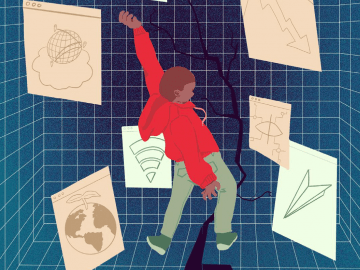
Nine trends in the future of work that may impact vulnerable workers
In the next two decades, the world of work will look very different than it does today. Major forces are driving change: digital technologies, artificial intelligence, climate change, demographic shifts, and more. What does the future hold for people who already face barriers in the labour market? In a new project report, an IWH team led by Scientist Dr. Arif Jetha lays out nine trends and what they may mean. A summary of the report is also available in At Work.

Disability and Work in Canada conference videos are now available
The devastating impact of COVID-19 on employment for people with disabilities was a major theme at the annual Disability and Work in Canada conference, held late last year. But participants also heard about ongoing initiatives on strengthening income support, promoting workplace inclusion, measuring progress—and many others that make up a pan-Canadian strategy to improve paid employment opportunities for persons with disabilities. Conference videos are now available at the Centre for Research on Work Disability Policy conference page.

Upcoming IWH Speaker Series presentation: Exploring differences between stress and musculoskeletal claims
Workers’ compensation boards in several provinces across Canada now recognize work-related chronic stress claims. In the state of Victoria, Australia, where such claims have been accepted for many years, differences are found between mental health and musculoskeletal claims in return-to-work outcomes and processes. In an IWH Speaker Series presentation on April 6, IWH Senior Scientist and Scientific Co-Director Dr. Peter Smith delves into the differences between these two types of claims and explores the lessons they may hold for Canada.

IWH announces this year’s Syme recipients
Congratulations to the four recipients of a 2021 S. Leonard Syme Fellowship in Work and Health. They are: Kathleen Dobson, University of Toronto; David Kinitz, University of Toronto; Jennifer Ritonja, Queen’s University; and Siobhan Saravanamuttu, York University. The Syme fellowships were established by IWH in 2002 to support early-career researchers who intend to study work and health.

IWH Updates - Spring 2021
IWH welcomes new post-doc researcher ~ IWH announces Mustard post-doctoral fellowship recipient ~ Announcing four recipients of the 2021 S. Leonard Syme Fellowships
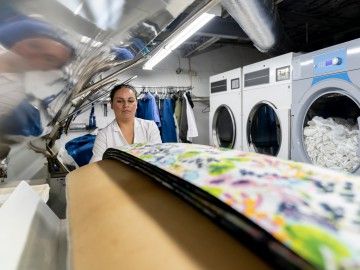
Age, tenure raise risk of job precarity among workers with disabilities
Which groups of workers are at greater risk of working in precarious jobs? According to a new IWH study, among people with disabilities, older workers and workers with less tenure worker are those with higher risks.
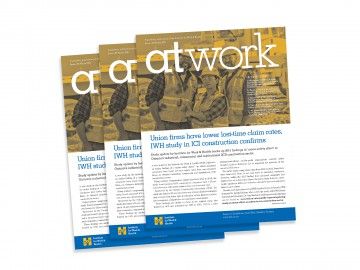
New issue of At Work now available
Inside the Winter 2021 issue:
- Unionized firms have lower lost-time injury rates than non-unionized ones, according to a second IWH study in Ontario's industrial, commercial and institutional construction sector.
- The differences between people who use cannabis at work and those who use, but never at work, are all related to the jobs people do or the work environments they're in.
- The impact of the pandemic on people with disabilities was a dominant theme at the 2020 Disability and Work in Canada conference, but some participants also spoke of hope.

What research can do: Workplace COVID outbreaks reported by Ontario public health account for one in 20 cases in working-age adults
In the second wave of COVID-19 in Ontario, workplace outbreaks—not including outbreaks in health-care, congregate living (e.g. correctional) and educational settings—represent slightly over five per cent of all cases among working-age adults, down from a high of 22 per cent in June. That’s according to an analysis by IWH Scientific Co-Director Dr. Peter Smith and President Dr. Cam Mustard, detailed in a new Issue Briefing.

IWH Updates - Winter 2021
IWH scientist wins career award ~ IWH scientist recognized by national pain body ~ Institute welcomes new board member ~ New resource now available to help prevent MSIs

What factors differentiate people who use cannabis at work and those who don't?
Job visibility. Supervisors willing to address on-the-job cannabis use. When examining the factors that set apart people who used cannabis at work from those who used cannabis but never on the job, researchers at IWH found some factors that were expected, including the factors mentioned above. But some of the factors they found were both surprising and hard to explain.
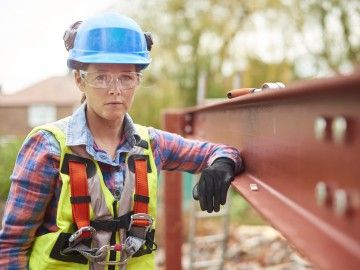
New resource to help workplaces implement MSD prevention programs
Workplaces currently use a range of practices to prevent musculoskeletal disorders (MSDs)—from ergonomics training and workstation adjustments to work redesign. To help workplaces identify and implement appropriate prevention programs, a research team at IWH worked with partners in Newfoundland and Labrador to create a resource that draws upon the best available research evidence, integrated with practitioner expertise and stakeholder experiences. The resource is now available to download.

Why people decide to disclose an episodic disability at work—and how that matters
Some of the most common chronic health conditions are episodic and invisible. As a result, people living with them often grapple with the complex decision of whether to tell their employers about their disability. A new study, led by IWH Senior Scientist Dr. Monique Gignac, looks at people’s reasons for disclosing or not. The findings shed light on how people’s reasons matter to the work support they subsequently receive.

Issue Briefing examines role of workplace COVID outbreaks in Ontario’s second wave
In the current second wave of COVID-19 in Ontario, workplace outbreaks—not including outbreaks in health-care, congregate living (e.g. correctional) and educational settings—represent slightly over five per cent of all cases among working-age adults, down from a high of 22 per cent in June. That’s according to an analysis by IWH Scientific Co-Director Dr. Peter Smith and President Dr. Cam Mustard, detailed in a new Issue Briefing.

The “union safety effect” in Ontario’s construction sector: study update
Five years ago, a study conducted by IWH compared work-related injury rates between unionized and non-unionized companies in Ontario’s institutional, commercial and industrial (ICI) construction sector. It found unionized companies had lower rates of lost-time injury claims than their non-unionized counterparts, after accounting for other factors like company size. Is this “union safety effect” still holding true? On Tuesday, January 12, Dr. Lynda Robson shared an update at an IWH Speaker Series presentation. The full report of that study is now available.
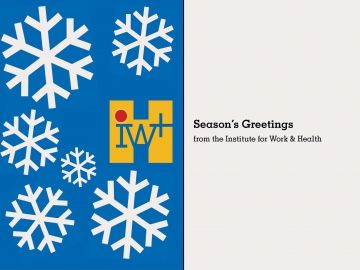
Season’s Greetings from all of us at IWH
With the approach of a holiday season like no other, we at the Institute for Work & Health (IWH) send you our very best wishes. It has been quite a year. More than ever, we look back on it and forward to the next with the utmost appreciation for your support and commitment to safe work and healthy workers.

Rapid antigen detection testing a potential game-changer
Rapid antigen detection tests can play an important role in the next phase of Canada’s COVID-19 response. With a convenience that some have likened to that of home pregnancy tests, these rapid tests can be used in workplace settings—foremost for repeated testing in high-risk workplaces such as long-term care homes, food manufacturing facilities and correctional institutions, writes IWH President Dr. Cam Mustard.

IWH 2019/20 annual report looks at the Institute’s COVID pivot
In March 2020, when the World Health Organization declared the global outbreak of COVID-19 a pandemic, the very thing we study at IWH—the intersection between work and health—changed dramatically. The 2019/20 annual report, now out, looks at how IWH pivoted to address this disruption by adapting research in progress to include a COVID-19 lens, and by working with collaborators to conduct new research related to the effects of the new coronavirus.

Working with a rheumatic disease: a new tool for young people
Young people with rheumatic health conditions such as juvenile arthritis or lupus face unique challenges as they begin their working lives. A new tool is now available to help them navigate these challenges. "Working with a rheumatic disease" is an interactive tool designed to help young people identify potential challenges and find information and trusted resources to overcome them. It was developed by the Institute for Work & Health with support from Cassie + Friends and funding from the Centre for Research on Work Disability Policy.

IWH Updates - Fall 2020
IWH scientist recognized by pain society ~ IWH research associate wins presentation award ~ Institute welcomes three new adjunct scientists

Cochrane back group earns high praise for its rigorous systematic reviews
Since its founding in 1996, Cochrane Back and Neck has consistently ranked high among Cochrane groups in terms of number of articles accessed, cited and incorporated in clinical guidelines. In an article published in Spine, IWH Scientist Dr. Andrea Furlan looks back at the accomplishments of the review group, housed at IWH until last year. She attributes the group’s successes to its rigorous methods, high-quality syntheses and continued innovation.

COVID-19: Challenges and opportunities in OHS and social security highlighted at global session
Last month, the global community of occupational health and safety (OHS) and social security policy-makers gathered online to discuss challenges and lessons learned as countries respond to the COVID-19 pandemic emergency. Highlights of the October 5-6 special session, held by the organizers of next fall’s XXII World Congress on Safety and Health at Work 2021, are summarized in this article.

Second study finds COVID-19 protection at work is linked with workers' mental health
Levels of anxiety and depression are higher when workers feel they lack COVID-19 protection on the job. That's according to a study of Canadian workers not in health-care, a second in a pair of studies conducted by the Institute for Work & Health (IWH) and Occupational Health Clinics for Ontario Workers (OHCOW) in the early months of the pandemic. Mental health was even poorer among essential workers who said they had no protection at work than among those who had lost their jobs since the start of the pandemic, according to this second study.